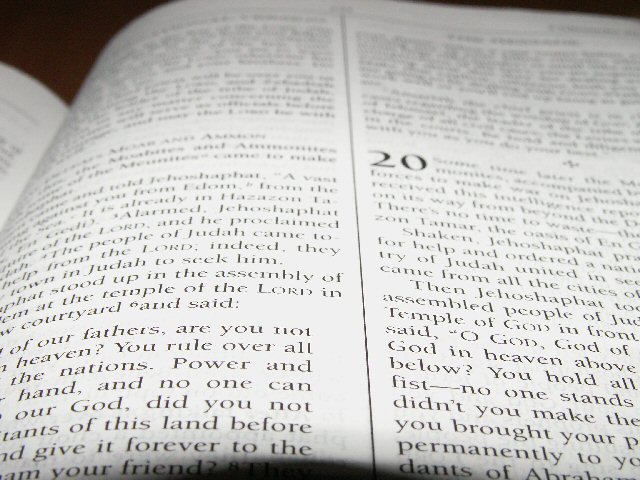While the Bible may be the top-selling and most widely distributed nonfiction book, it’s not exactly topping reading lists in public schools.
Not that it has to be.
But seemingly, today’s public school systems maintain a non-disruptive learning environment by subduing religious expression on campus. An example of this can be found in last week’s news coverage of religion in student media.
The B-I-B-L-E, yes that’s the book for – nope, not during this free-reading time
An elementary school student told not to read the Bible in an after-school reading program will now receive assistance from Tennessee’s American Civil Liberties Union, the Christian Post reported. The student was told in free-reading that he couldn’t read his Bible and that the staff would lose their state funding if they allowed him to continue reading.
The ACLU responded with a letter to the Cannon County REACH after school program on the child’s behalf, asking that the Bible continue to be allowed during free reading or any time throughout the day. An excerpt from the letter states:
“Tennessee public school students cannot be denied the right to engage in religious activities during student activity times, recess and other free time, provided they do not cause a disruption or interfere with the education of other students. Reading the Bible, or any other religious text, during a free-read period would fall within these protected freedoms.”
According to the ACLU, misconceptions of religious liberty in the Constitution by Tennesseans are partly to blame for this issue. Thomas H. Castelli, ACLU-TN legal director set the record straight in ACLU’s press release:
“The First Amendment exists to protect religious freedom…While this means that schools may not impose or promote religion, it also means that students can engage in religious activities that they initiate, provided they do not cause a disruption or interfere with the education of other students.”
The ACLU also argued against a bill that would protect students from religious discrimination and provide a limited forum for discussion, “Religious Viewpoints Antidiscrimination Act.” The ACLU stated in their alert that it “crosses the line from protecting religious freedom into creating systematic imposition of some students’ personal religious viewpoints on other students.” That might be the crux of the issue on today’s campuses.
There is a belief that students are being disrupted. In some cases, maybe they are. However, this student reading his Bible is not disrupting anyone. The reading falls under his First Amendment rights.
Imposing beliefs on others takes more than the display of ideas, and students must learn to discern what ideas to incorporate into their own thinking. Students must continually engage ideas to learn. Religion is a part of civic and cultural life, and keeping students from these ideas and philosophies only limits their worldview and capacity for knowledge and compassion.
Religious expression does get a little more complicated when the intent is to preach or to discuss religion, but the rights still support it. A case from a couple weeks ago reinforces this right.
Preach it? Virginia college student denied right to preach on campus
It was just another day at Thomas Nelson Community College for Christian Parks who only wanted to share his faith on campus as he had done twice before.
This time though, Parks was ordered by campus police officers to stop and request permission in advance, as laid out in campus demonstration policy, OneNewsNow reported Thursday.
In an effort to protect his right to speech, Parks sued the college a couple weeks ag0, claiming in his lawsuit that the policy was unconstitutional. Parks had two past altercations with school police, but wanted to profess his belief anyways. The lawsuit states:
“It is repugnant to Mr. Parks that he, as an individual citizen and student at a public community college, must notify the government in order to speak on campus when he feels convicted by his religious faith to speak and preach on campus…The fear of arrest or punishment severely limits Mr. Parks’ constitutionally-protected
expression on campus.”
David Hacker, Alliance Defending Freedom attorney, helped with Parks’ lawsuit, and said to OneNewsNow that declaring something offensive prior to it happening limits the function of colleges which is to inform and challenge and student conversation.
“It’s a very clear situation of colleges – which are supposed to be the marketplace of ideas – censoring and restricting students’ free speech, which all too often happens to the Christian students on campus,” Hacker said.
The ACLU Executive Director in Virginia, Claire Guthrie Gastañaga said that a student shouldn’t need permission to speak freely on campus to his peers, calling it “absurd and unconstitutional” in the Christian Post. She’s right. Restrictions on faith expression further restrict speech. Both inhibit the creation and tolerance of ideas on a college campus that are essential to learning and maturity into civic life.
These issues lead only to more questions about religious expression on campus: Where and when is it appropriate for students to express their religious beliefs on campus? When does religious practice and expression become imposition or disturbance of the campus environment?
Did I leave you wanting more? Here are some responses to religious liberties on public campuses that I found interesting from this week.
– An overarching view of the issues in religious liberty from Charles C. Haynes of the Religious Freedom Center at the Newseum in Washington, D.C.: http://www.poconorecord.com/apps/pbcs.dll/article?AID=/20140405/NEWS04/404050324/-1/NEWSMAP
Learning to understand and love the many, open to the few and far between with tolerance: http://fiusm.com/2014/04/04/does-god-hate-people-or-do-people-hate-god/

